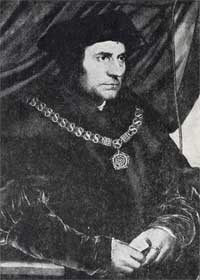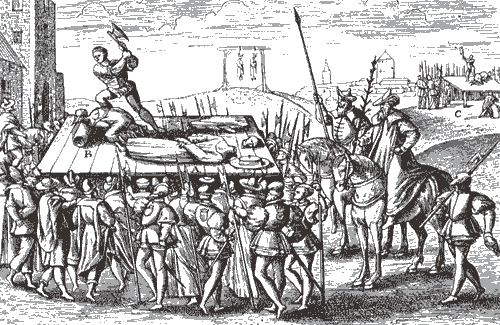Sir Thomas More (1478-1535) was born in London and aspired to become an English statesman and humanist writer. Educated at Canterbury Hall (now Christ Church), Oxford University. After leaving Oxford, more pursued studies in law, though primary interests were in science, theology and literature.

Thomas More, painting by Holbein
During his early adulthood, he composed comedies and spent much of his time on Greek and Latin studies. He determined to become a monk, in 1499, subjecting himself to the Carthusian discipline. He gave up the plan four years later and entered Parliament in 1504. One of his first acts was an urge for decrease in proposed appropriation for King Henry VII. The king imprisoned More's father in revenge and no release issued until More withdrew from public life, and a fine was paid. More became active again, following Henry VII.'s death in 1509, and in 1510 was appointed under-sheriff of London.
In the following decades, More gained the attention of King Henry VIII and served on diplomatic missions to the Low Countries. Becoming a member of the privy council in 1518, and was knighted in 1521. More was then made speaker of the House of Commons two years later. It was during period King Henry VIII sought More's company for philosophical conversations, and made lord chancellor in 1529. More was the first layman to hold such post.
However, More's fortune changed after refusing to support Henry's wish to divorce Catherine of Aragon. More's religious devotions prohibited him from defying papal authority and resigned his chancellorship in 1532, withdrawing from public notice. The king, resenting More's actions, had him arrested and imprisoned in 1534 and tried the following year for refusing to take part in the Oath of Supremacy. Thomas More's view was that Parliament had no right to usurp Papal Authority in favor of the King, and for this More was condemned and decapitated, July 7, 1535. More was canonized by the Church of Rome, in 1935.

Bishop John Fisher and Thomas More, publicly beheaded in 1535.
More is known for his authorship of Utopia, 1516. In this writing he exploits the popular credulity of the time, regarding remote lands and people, and produced a satire on the government and English society as he knew it. His fictitious book accounts conversation with Ralph Hythlodaye, a sailor who served on the crew with Amerigo Vespucci, and concerns lifestyle on the the fictitious island of Utopia. On More's fictitious island, individual interests are superceded by those interests for society as a whole. Universal education, work and religious toleration are practiced and all land is common property. The conditions in Utopia, are in contrast with the conditions of England.
References
- Funk and Wagnalls Encyclopedia ©1950


No comments:
Post a Comment